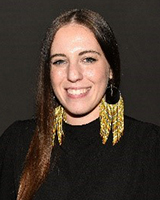IHDCYH Institute Advisory Board Members – Biographies

Bernard Thébaud, MD, PhD (Chair)
Senior Scientist, Regenerative Medicine, Ottawa Hospital Research Institute & CHEO Research Institute
Neonatologist, Division of Neonatology, The Ottawa Hospital and the Children’s Hospital of Eastern Ontario
Professor of Pediatrics, University of Ottawa
Tier 1 Canada Research Chair in Lung Stem Cell Biology and Regeneration
Dr. Bernard Thébaud is a clinician-scientist with a focus on the clinical translation of stem cell-based and gene therapies for lung diseases. He is a senior scientist with the Ottawa Hospital Research Institute and a neonatologist with the Children’s Hospital of Eastern Ontario, providing care to critically ill newborns. He is also a Professor of Pediatrics at the University of Ottawa.
Dr. Thébaud obtained his MD at the University Louis Pasteur in France and trained in Pediatrics and Neonatology at the University Paris V, where he obtained his MSc and PhD, before completing a 2-year postdoctoral fellowship at the University of Alberta.
Dr. Thébaud studies the mechanisms of lung development, injury and repair to design new treatments for incurable lung diseases. His focus is on answering clinically relevant questions for translation into real-life applications. His lab discoveries are now in clinical trials with the hope to bring safe and effective cell and gene therapies to patients with lung diseases to improve their outcomes.
Dr. Thébaud has participated on numerous peer review committees and scientific advisory boards at the international, national and provincial level, including CIHR and NIH. His research is funded by a CIHR Foundation Scheme grant, the Heart and Stroke Foundation of Canada, the Stem Cell Network and the Ontario Institute of Regenerative Medicine.

Kristin Connor (Vice-Chair)
Associate Professor, Developmental Origins of Health and Disease, Health Sciences, Carleton University
Dr. Kristin Connor is an Associate Professor of Developmental Origins of Health and Disease in the Department of Health Sciences at Carleton University. She is a molecular geneticist and nutritionist by first training (University of Guelph) and obtained her doctorate in reproductive and developmental physiology in the Faculty of Medicine at the University of Toronto, where she conducted her research internationally. She was a Research Fellow and Investigator at the Liggins Institute and the National Research Centre for Growth and Development in Auckland, New Zealand, and a senior Research Fellow at the Lunenfeld-Tanenbaum Research Institute at Mount Sinai Hospital in Toronto.
Dr. Connor has established a transdisciplinary and translational research programme (connorlab.ca) grounded in improving and supporting maternal, fetal, and child health. Her work seeks to understand maternal health and developmental trajectories in early life, and how these states are established and can be modified to influence an individual’s lifelong health resilience or disease risk. Her team’s research focuses on novel ways to predict individuals at-risk for adverse pregnancy outcomes, suboptimal development, and later chronic disease, and novel interventions to optimise maternal health and early developmental trajectories to reduce the incidence of adverse pregnancy outcomes, poor fetal/child growth, and chronic diseases in later life. Her work also seeks to close the evidence-practice gap by understanding how to improve implementation approaches and mobilise knowledge for health promotion, empowerment, and disease prevention. She is funded through national agencies including the CIHR, NSERC, and the Molly Towell Perinatal Research Foundation. Dr. Connor is a graduate of the Corporate Governance programme at the Wharton Business School, is an Associate Editor with the Journal of Developmental Origins of Health and Disease, and is a dedicated member of national and international scientific societies, including DOHaD and the Society for Reproductive Investigation (SRI), where she serves as an SRI Council Member and Chair of the Global Outreach committee. Dr. Connor is excited to contribute to the IHDCYH IAB.

Isabelle Boucoiran, MD, MSc
Clinical Associate Professor, Department of Obstetrics and Gynecology, Université de Montréal
Co-director, Women and Children Infectious Disease Centre
Dr. Isabelle Boucoiran is Clinical Associate Professor at Université de Montréal (QC). She is a mid-career clinician-scientist at the School of Public Health and the Obstetrics and Gynecology Department of the CHU Sainte-Justine, where she is co-director of the Women and Children Infectious Disease Centre (CIME).
Her main area of research is the diagnosis, management, and prevention of infections in pregnancy. Her research expertise is at the crossroads of several fields, from basic science to epidemiology and public health. Her research program is funded by the Canadian Institutes for Health Research, the US National Institutes of Health, the "Fonds de Recherche du Québec – Santé" and the Quebec health ministry. Isabelle is a member of the College of New Scholars, Artists and Scientists of the Royal Society of Canada.

Carolyn Emery
Professor, Faculty of Kinesiology & Pediatrics & Community Health Sciences, Cumming School of Medicine, University of Calgary
Chair, Sport Injury Prevention Research Centre
Carolyn Emery PT PhD is a physiotherapist and epidemiologist and a Professor in the Faculty of Kinesiology and Pediatrics and Community Health Sciences in the Cumming School of Medicine at the University of Calgary. Carolyn holds a Canada Research Chair (Tier 1) in Concussion, is Chair of the Sport Injury Prevention Research Centre at the University of Calgary (1 of 11 International Olympic Committee Centres for Prevention of Injury and Protection of Athlete Health) and is the Scientific Director of the Institutes of Transdisciplinary Scholarship, Vice President Research Office, University of Calgary. She is a Fellow in the Canadian Academy of Health Sciences and the Royal Society of Canada. Carolyn completed her BSc in Physiotherapy at Queens University in 1988 and after several years of practice in pediatric rehabilitation and sport medicine, she completed her MSc in Epidemiology (Community Health Sciences, Faculty of Medicine) at the University of Calgary in 1999 and her PhD in Epidemiology (Public Health Sciences, Faculty of Medicine) from the University of Alberta in 2004. Carolyn is a member of Hotchkiss Brain Institute, Alberta Children's Hospital Research Institute, O'Brien Institute of Public Health, and McCaig Institute of Bone and Joint Health. Her research program spans the prevention of youth sport-related concussions and musculoskeletal injuries and their consequences, concussion, Para sport, female/woman/girl athlete injury health and safety, and equity-deserving youth communities. She leads a pan-Canadian program of research "SHRed Concussions: Surveillance in High School and Community Sports to Reduce Concussions and their Consequences for Youth" and "You-CAN SHRed Concussions". This is a youth-centres program working with equity-deserving youth sport communities to reduce the burden of concussions and their consequences for all youth. Carolyn aims to keep kids participating in the sports they love to support life-long sport and physical activity participation.

Ryan Giroux, MD FRCPC
Assistant Professor, Department of Paediatrics, Temerty Faculty of Medicine, University of Toronto
General Paediatrician, St. Michael's Hospital, Unity Health Toronto
Dr. Ryan Giroux is an Assistant Professor and General Pediatrician at St. Michael's Hospital and the Inner City Health Associates in Toronto. He works primarily with urban Indigenous children and families, along with refugees and newcomers across Toronto and Scarborough. He is Métis from the Métis Nation of Alberta as well as mixed settler heritage, and grew up on Treaty 6 and 8 territory in his hometown of Athabasca, Alberta.
He is an Indigenous Educator at the Royal College of Physicians and Surgeons of Canada, the Temerty Faculty of Medicine's Postgraduate Medical Education Indigenous Health Lead, the Co-Chair of the Canadian Paediatric Society's First Nation, Inuit, and Metis Health Committee, and a board member of the Indigenous Physicians Association of Canada. He speaks routinely at the local, national, and international level in various spheres related to Indigenous child health and Indigenous medical education.

Rae Martens
Parent
Knowledge Broker
Rae Martens is a bereaved parent from Calgary, Alberta and has had extensive experience within the pediatric healthcare system. She had the privilege of raising her son Luke who was born with a rare chromosome diagnosis for 14 years which made him medically complex. She has been a partner in health research for 10 years. She now uses that experience as a partner to work as a Knowledge Broker in pediatric health research. Mentoring people with lived experience and researchers through the process of building healthy partnerships. Through her roles within the University of Calgary and CanChild (McMaster University), she connects with a wide variety of researchers and community members. Rae's quite passionate about knowledge mobilization, complex community engagement ecosystems, crochet and coffee.

Alexa Martin-Storey
Professor, Department of Psychoeducation, Université de Sherbrooke
Alexa Martin-Storey is a professor in the department of Psychoeducation at the Université de Sherbrooke. Her work focuses on the factors by which stigma, and particularly gender-based stigma and resulting discrimination shapes health and psychosocial functioning among adolescents and young adults. She currently holds the Canada Research Chair in Stigma and Psychosocial Development.

Souvik Mitra MD, MSc, PhD, FRCPC, DRCPSC
Associate Professor of Pediatrics, University of British Columbia
Michael Smith Health Research BC Health-Professional Investigator, BC Children's Hospital Research Institute
Neonatologist, BC Women's Hospital, Provincial Health Services Authority
Dr. Souvik Mitra is a staff Neonatologist at the BC Women's Hospital, Associate Professor of Pediatrics at the University of British Columbia and Clinician-Scientist at the BC Children's Hospital Research Institute, Vancouver, Canada. He completed his fellowship in Neonatal-Perinatal Medicine and MSc in Clinical Epidemiology from McMaster University and his PhD in Epidemiology and Applied Health Research from Dalhousie University. He holds a Diplomate of the Royal College of Physicians and Surgeons of Canada in Neonatal Hemodynamics and Targeted Neonatal Echocardiography.
His research program, supported by the Michael Smith Health Research BC Health Professional Investigator award, aims to improve outcomes of the smallest and sickest newborns through multicenter, multinational clinical trials and by incorporating the principles of 'evidence-based medicine' in their care.
He is the Chair of the Fetus and Newborn Committee of the Canadian Pediatric Society, member of the Institute Advisory Board, Institute of Human Development, Child and Youth Health (IHDCYH) and the College of Reviewers, CIHR. He serves as an Associate Editor for the Cochrane Neonatal Group and co-chairs the Academic Committee of the Neonatal Hemodynamic Research Centre. Additionally, he is the Research Director for the Division of Neonatology and co-Program Director of the Neonatal Hemodynamics and Targeted Neonatal Echocardiography program at BC Women's Hospital Vancouver.

Taylor Morriseau
Health Systems Impact Postdoctoral Fellow
First Nations Health and Social Secretariat of Manitoba/University of Toronto
Dr. Morriseau (Peguis First Nation) is a Health Systems Impact Fellow with the First Nations Health and Social Secretariat of Manitoba and the Dalla Lana School of Public Health (University of Toronto). She received her PhD from the University of Manitoba with a focus on gene-environment interactions underlying type 2 diabetes among First Nations youth. As a postdoctoral fellow, she is advancing First Nations governance in genomic and data sciences, while supporting community-led data sovereignty initiatives. She presently sits on the executive Indigenous Health Committee within the Accelerating Clinical Trials (ACT) Consortium and holds an IMPaCT Early Career Research Award to address the underrepresentation of First Nations within or leading clinical trials.
She is committed to broader scientific and societal challenges encompassing Indigenous health, genomics, ethics, and science policy through advisory positions with CIHR-IHDCYH and the Native BioData Consortium (NBDC). She has been a recipient of the WXN Canada's Most Powerful Women Top 100 Award, a Manitoba 150 Women Trailblazer Award, and a University of Manitoba Distinguished Young Alumni Award.

Stephanie Priest
Director General, Centre for Mental Health and Wellbeing
Public Health Agency of Canada
Stephanie Priest is the Director General of the Centre for Mental Health and Wellbeing at the Public Health Agency of Canada. The Centre provides public health leadership on mental health promotion, suicide prevention, prevention of substance related harms, family violence prevention and trauma supports, including addressing posttraumatic stress disorder. The Centre for Mental Health and Wellbeing works with stakeholders across Canada to help foster environments that support positive mental health and prevent mental illness, including programs focused on reducing health inequalities by promoting the mental health and well-being of children, youth and families.
Stephanie lives and works in Ottawa, Ontario Canada, on the traditional, unceded, and unsurrendered territory of the Algonquin Anishinaabeg people. She has over 25 years of experience in health policy development in the federal government of Canada. Stephanie has worked extensively in leadership, management, and health care systems policy in collaboration with communities, provincial and territorial governments and national and international partners.

Bukola (Oladunni) Salami, RN, MN, PhD
Professor and Tier 1 Canada Research Chair in Black and Racialized Peoples' Health, Cumming School of Medicine
University of Calgary
Professor Bukola Salami is a Registered Nurse, Tier 1 Canada Research Chair in Black and Racialized People's Health and a Full Professor in the Department of Community Health Sciences, University of Calgary. She received her Bachelor of Science in Nursing from the University of Windsor and her Master of Nursing and PhD in Nursing from the University of Toronto. Professor Salami’s research program focuses on the well-being of Black, immigrant, and racialized people. She has been involved in over 100 funded studies totalling over $250 million. She founded and leads the African Child and Youth Migration Network, a network of 42 scholars from four continents. In 2020, she founded the Black Youth Mentorship and Leadership Program, the first university-based fully interdisciplinary mentorship program for Black youths in Western Canada. This program seeks to socially and economically empower Black high school youths to meaningfully contribute to Canadian society. Her work on Black youth mental health informed the creation of the first mental health clinic for Black Canadians in Western Canada (which was founded by Africa Centre and the Alberta Black Therapist Network). She has presented her work to policy makers (including the House of Commons Standing Committee on Health). She has trained over 100 undergraduate and graduate students, including many (~10) who are now Assistant or Associate Professors. Professor Salami is Vice President of the Canadian Nurses Association and board member of Black Opportunity Fund. In addition to being an Editor for the Canadian Journal of Nursing Research and on the Editorial Board of Nursing Inquiry, Nursing Philosophy, and Qualitative Health Research. She is a governing council member of the Social Sciences and Humanities Research Council of Canada, an advisory board member of the CIHR Institute for Human Development, Child and Youth Health, and on the Scientific Advisory Committee on Global Health to the Government of Canada.
Dr. Salami has received several awards for research excellence and community engagement: 100 Accomplished Black Women in Canada; Sigma Theta Tau International Honor Society of Nursing Emerging Nurse Researcher of the Year Award; College and Association of Registered Nurses of Alberta (CARNA) Award for Nursing Excellence; Rosalind Smith Professional Award from the National Black Coalition of Canada – Edmonton Chapter; Alberta Avenue Edmonton Top 40 under 40; Sigma Theta Tau International Honor Society International Nurse Researcher Hall of Fame; Fellow of the Canadian Academy of Nursing; Killam Accelerator Award (a $225,000 value for research); Top 25 Canadian Immigrants; Queen Elizabeth II Platinum Jubilee Medal; Health Research Foundation Equity, Diversity and Inclusion Award; and Fellow of the American Academy of Nursing.

Keiko Shikako
Canada Research Chair in Childhood Disability: Participation and Knowledge Translation
Associate Professor, McGill University School of Physical and Occupational Therapy
Dr Shikako's research focuses on the promotion of healthy living and the human rights of children with disabilities, and knowledge translation science and practice. Her research program adopts a participatory approach to engage different interested parties, including policymakers, community organizations, youth and their families in finding solutions to change the environment, inform policymaking and promote the participation of children with disabilities in different life roles and activities. She leads several knowledge translation initiatives, including the Jooay App, the CHILD-BRIGHT SPOR KM Program, the CanNRT KT to Policy initiative and is part of the civil society groups reporting to the UN on the Convention on the Rights of Persons with Disabilities.
Current research projects include the Jooay App implementation; the CHILD-BRIGHT /CanNRT Policy hub, Youth employment pathways through Accessibility in the community; the CHILD: Canadian Health Indicators for Children with Disabilities, and the Beyond Convention: How is the United Nations Convention on the Rights of Persons with Disabilities working for Persons with Disabilities in Canada?

Padmaja Subbarao, MD,MSc
CRC (Tier 1) Pediatric Asthma and Lung Health & Professor of Pediatrics, Physiology and Dalla Lana School of Public Health
Associate Chief, Clinical Research and Co-Lead of Precision Health Initiative, Hospital for Sick Children
Director, CHILD Study
Dr. Subbarao is a Clinician-Scientist in the Division of Respirology at The Hospital for Sick Children and holds a CRC Tier 1 Chair in Pediatric Asthma and Lung Health at the University of Toronto. Trained in both Epidemiology and infant and preschool lung function, she is a Professor in the Departments of Pediatrics, Physiology and Dalla Lana School of Public Health at the University of Toronto. Dr. Subbarao is an international leader in lung function and asthma, co-authoring clinical practice guidelines and position statements. She serves on advisory boards to the NIH for asthma cohort studies.
Dr. Subbarao’s research program focuses on disentangling preschool wheeze heterogeneity to precisely predict who will develop each type of asthma, monitor its progression and discover the underlying biology associated with each asthma subtype. She is the Director of the CHILD study, one of the largest, most intensively characterized asthma birth cohorts in the world. This world-leading study enabled the discovery of the importance of the gut microbiome for the protection against asthma. She also established the first infant lung function laboratory in Canada. Her research in early life lung function as a biomarker and identification of risk factors in asthma have enabled the earlier, precise prediction and monitoring of its progression, thus advancing the diagnosis and treatment of children with asthma.
Dr. Subbarao was appointed Co-Lead of the Precision Child Health Initiative in 2020, and in 2021 she was appointed Associate Chief, Clinical Research at the Hospital for Sick Children. In these roles, she is helping transform SickKids into a learning health system. This is a critical step in our movement to shift toward pediatric healthcare that integrates an individual’s biological, environmental and patient reported data and harness emerging discoveries to predict better, diagnose faster and treat smarter.

Yao Zheng
Associate Professor, Department of Psychology, University of Alberta
Dr. Yao Zheng is an Associate Professor in the Department of Psychology at the University of Alberta in the Developmental Science area. He was previously a Postdoctoral Fellow at Simon Fraser University and University of Quebec at Montreal. He received his Ph.D. and M.S. in Human Development and Family Studies, as well as a M.A.S. in Applied Statistics, from the Pennsylvania State University. He received his B.S. in Psychology from Yuan Pei Honors College, Peking University. During graduate school, he also visited the Department of Developmental Psychology at Friedrich-Schiller University Jena and the Social, Genetic, & Developmental Psychiatry Center at King’s College London as a visiting graduate student.
Guided by a developmental psychopathology approach, Dr. Zheng’s research focuses on the development and prevention of child and adolescent behavioral and emotional problems with the ultimate goal of informing intervention to promote physical and mental well-being. Specifically, as a lifespan developmental researcher, he investigates the influences of family and peer processes that shape normal and atypical development at multiple levels of analysis (e.g., genetic, psychological, behavioral) and timescales (e.g., days, years) in various ecological contexts (e.g., family, culture). He is particularly interested in how children and adolescents from at-risk or ethnic/racial minority populations can prosper and show resilience despite adverse experiences.
- Date modified: